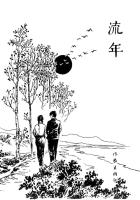Mr. Maclennan was evidently worried. His broad, good-humoured face, which usually wore a smile indicating content with the world and especially with himself, was drawn into a frown. The muskeg was beating him, and he hated to be beaten. He was bringing in General Manager Fahey to have a look at things. It was important to awaken the sympathy of the General Manager, if, indeed, this could be accomplished. But the General Manager had a way of insisting upon his contracts being fulfilled, and this stretch in Maclennan's charge was the one spot which the General Manager feared would occasion delay.
"There's the hole," said Maclennan, as they turned down the hill into the swamp. "Into that hole," he continued, pointing to where the dump ended abruptly in the swamp, "I can't tell you how many millions of carloads have been dumped. I used to brag that I was never beaten in my life, but that hole--"
"Maclennan, that hole has got to be filled up, bridged, or trestled, and we can't wait too long, either."
The General Manager's name was a synonym for a relentless sort of energy in railroad construction that refused to consider obstacles.
Nothing could stand in his way. The thing behind which he put the weight of his determination simply had to move in one direction or other. The contractor that failed expected no mercy, and received none.
"We're doing our best," said Maclennan, "and we will continue to do our best. Hello! what's this? What's Craigin doing up here? Hold up, Sandy. We'll look in."
At the door of the hospital Dr. Haines met him.
"Hello, Doctor! What have you got here?"
"Isolation hospital," replied the doctor shortly.
"What hospital?"
"Isolation."
"Has Craigin gone mad all at once?"
"Craigin has nothing to do with it. There's a new boss in camp."
A look of wrathful amazement crossed Maclennan's countenance.
Haines was beginning to enjoy himself.
"A new boss? What do you mean?"
"What I say. A young fellow calling himself Dr. Bailey came into this camp three days ago, raised the biggest kind of a row, laid up Craigin with a broken head, and took charge of the camp."
Maclennan stood in amazement looking from Haines to the General Manager.
"Dr. Bailey? You mean Bailey from No. 1? What has he got to do with it? And how did Craigin come to allow him?"
"Ask Craigin," replied Haines.
"What have you got in there, Doctor?" asked Mr. Fahey.
"Diphtheria patients."
"How many?"
"Well, we began with eight three days ago and we've ten to-day."
"Well, this knocks me out," said Maclennan. "Where's Craigin, anyway?"
"He's down in his own room in bed."
Maclennan turned and got into the sleigh. "Come on, Fahey," he said, "let's go down. Something extraordinary has happened. You can't believe that fellow Haines. What are you laughing at?"
Fahey was too much of an Irishman to miss seeing the humour of any situation. "I can't help it, Maclennan. I'll bet you a box of cigars that man Bailey is an Irishman. He must be a whirlwind.
But it's no laughing matter," continued the General Manager, sobering up. "This has a very serious aspect. There are a whole lot of men sick in our camps. You contractors don't pay enough attention to your health."
"Health! When you're driving us like all possessed there's no time to think of health."
"I tell you, Maclennan, it's bad policy. You have got to think of health. The newspapers are beginning to talk. Why, look at that string of men you met going out. Of course, the great majority of them never should have come in. Hundreds of men are here who never used either shovel or axe. They cut themselves, get cold, rheumatism, or something; they're not fit for their work. All the same, we get blamed. But my theory is that every camp should have an hospital, with three main hospitals along this branch. There's one at Macleod. It is filled, overflowing. A young missionary fellow, Boyle, has got one running out at Kuskinook supported by some Toronto ladies. It's doing fine work, too; but it's overflowing. There's a young lady in charge there, a Miss Robertson, and she's a daisy. The trouble there is you can't get the fellows to leave, and I don't blame them. If ever I get sick send me to her. I tell you, Maclennan, if we had two or three first-class men, with three main hospitals, a branch in every camp, we'd keep the health department in first-class condition. The men would stay with us. We'd get altogether better results."
"That's all right," said Maclennan, "but where are you to get your first-class men? They come to us with letters from Directors or some big bug or other. You've got to appoint them. Look at that man Haines. He doesn't know his work and he's drunk half the time.
Dr. Bailey seems to be different. He certainly knows his work and he never touches whiskey. I got him up from the Gap to No. 1. In two weeks' time he had things in great shape. Funny thing, too, when he's fighting some sickness or busy he's all right, but when things get quiet he hits the green table hard. He's a wonder at poker, they say."
The General Manager pricked up his ears. "Poker, eh? I'll remember that."
"But this here business is going too far," continued Maclennan. "I didn't hire him to run my camps. Well, we'll see what Craigin has to say."
As they drove into the camp they were met by Narcisse, the cook.
"Bo' jour, M'sieu Maclenn'. You want something for hit?"
"Good-day, cook," said Maclennan. "Yes, we'll take a cup of tea in a few minutes. I want to see Mr. Craigin."
Narcisse drew near Maclennan and in subdued voice announced, "M'sieu Craigin, he's not ver' well. He's hurt hisself. He's lie on bed."
"Why, what's the matter with him?"
Narcisse shrugged his shoulders. "Oh, some leet' troub'. You pass on de office you see de docteur."
"Why, Haines is up at the hospital. We just saw him."















